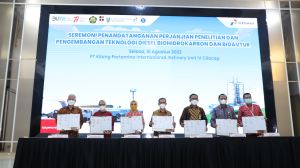 PT Rekayasa Industri (Rekind) again received a special gift at the age of 41 years. His commitment to innovation and technology development has yielded encouraging results.
PT Rekayasa Industri (Rekind) again received a special gift at the age of 41 years. His commitment to innovation and technology development has yielded encouraging results.Rekind is cooperating with the government through the Directorate of Bioenergy – Directorate General of New, Renewable Energy and Energy Conservation for the Development of Biofuel Technology (BBN) Diesel Biohydrocarbon and Bio Avtur.
Besides Rekind, this collaboration also includes PT Pupuk Sriwidjaja Palembang, PT Pertamina (Persero), PT Pertamina International Refinery (KPI) and the Bandung Institute of Technology.
The solidity of this synergy was marked by the signing of a collaboration between the Directorate of Bioenergy, the Directorate General of New, Renewable Energy and Energy Conservation, represented by Edi Wibowo as Director. In addition, the Center for Oil and Gas Testing represented by Ariana Soemanto as Head of Lemigas, President Director of Pertamina Nicke Widyawati, President Director of Rekind Triyani Utaminingsih, President 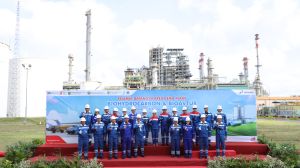 Director of PT Pupuk Sriwidjaja Palembang Tri Wahyudi Saleh, President Director of PT Pertamina International Refinery Taufik Adityawarman, and ITB Deputy Chancellor for Research and Innovation I Gede Wenten. This cooperation agreement was signed in Cilacap, Tuesday (16/8).
Director of PT Pupuk Sriwidjaja Palembang Tri Wahyudi Saleh, President Director of PT Pertamina International Refinery Taufik Adityawarman, and ITB Deputy Chancellor for Research and Innovation I Gede Wenten. This cooperation agreement was signed in Cilacap, Tuesday (16/8).
 Director of PT Pupuk Sriwidjaja Palembang Tri Wahyudi Saleh, President Director of PT Pertamina International Refinery Taufik Adityawarman, and ITB Deputy Chancellor for Research and Innovation I Gede Wenten. This cooperation agreement was signed in Cilacap, Tuesday (16/8).
Director of PT Pupuk Sriwidjaja Palembang Tri Wahyudi Saleh, President Director of PT Pertamina International Refinery Taufik Adityawarman, and ITB Deputy Chancellor for Research and Innovation I Gede Wenten. This cooperation agreement was signed in Cilacap, Tuesday (16/8).“For us, this collaboration is very proud, because it is a stage of the achievements made by Rekind as the only EPC company owned by the nation that actively contributes to industrial development in the country,” said Rekind’s President Director Triyani Utaminingsih.
This synergy certainly breathed its own ‘fresh air’ for Rekind in its efforts to develop the mission mandated by the state. “In addition, this collaboration also shows a picture that Rekind is indeed very competent, 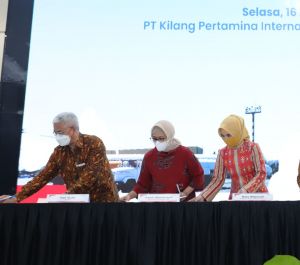 experienced, and highly committed in carrying out tasks, including those mandated by the state,” Triyani explained.
experienced, and highly committed in carrying out tasks, including those mandated by the state,” Triyani explained.
 experienced, and highly committed in carrying out tasks, including those mandated by the state,” Triyani explained.
experienced, and highly committed in carrying out tasks, including those mandated by the state,” Triyani explained.The estimated time required to complete the EPC of the National Strategic Project for the Biofuel Demo Plant is around 29 months. In this synergy, Rekind will carry out engineering stages consisting of the preparation of Basic Engineering Design (BED), Front End Engineering Design (FEED), and Detail Engineering Design (DED), including all detailed engineering documents including pre-design and post-construction documents. which is done gradually. “Almost all engineering scopes are carried out by Rekind, such as BED, FEED, and DED in the OSBL (outside Battery Limit) scope and BED in the ISBL (Inside Battery Limit) scope,” added Triyani.
This collaboration is a follow-up to the National Strategic Project (PSN) based on Presidential Regulation Number 109 of 2020 concerning the Third Amendment to Presidential Regulation Number 3 of 2016 concerning the Acceleration of the Implementation of National Strategic Projects, namely the Development of Green Diesel Bio Refinery Revamping in the Form of Hydrogenation. CPO at PUSRI Palembang. With various considerations, the location was moved to PT Pertamina International Refinery Unit IV Cilacap Refinery.
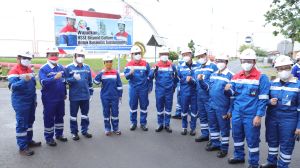
PSN Hydrogenation of CPO is the Development of Biohydrocarbon Diesel Technology and Bio Avtur with a capacity of 1300 liters of raw materials per day. The technology developed is in the form of a bio-hydrocarbon diesel production process and bio-avtur from industrial vegetable oil (IVO)/industrial lauric oil (ILO)/mixed industrial vegetable oil (MIVO) using the Red and White catalyst developed by ITB.
The technology development stages consist of BED, FEED, DED, procurement, construction, commissioning and trial of a stand alone factory with a capacity of 1300 liters of raw materials per day as a pilot for the next stage, namely a commercial scale factory.
Biodiesel from palm oil is increasingly being used as a substitute for fossil fuels. In terms of direct carbon 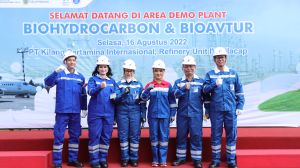 footprint, only palm oil was able to record a 50% reduction in emissions compared to diesel oil. Biofuels also only produce a quarter of the amount of carbon dioxide (CO2) produced by conventional diesel oil.
footprint, only palm oil was able to record a 50% reduction in emissions compared to diesel oil. Biofuels also only produce a quarter of the amount of carbon dioxide (CO2) produced by conventional diesel oil.
 footprint, only palm oil was able to record a 50% reduction in emissions compared to diesel oil. Biofuels also only produce a quarter of the amount of carbon dioxide (CO2) produced by conventional diesel oil.
footprint, only palm oil was able to record a 50% reduction in emissions compared to diesel oil. Biofuels also only produce a quarter of the amount of carbon dioxide (CO2) produced by conventional diesel oil.
